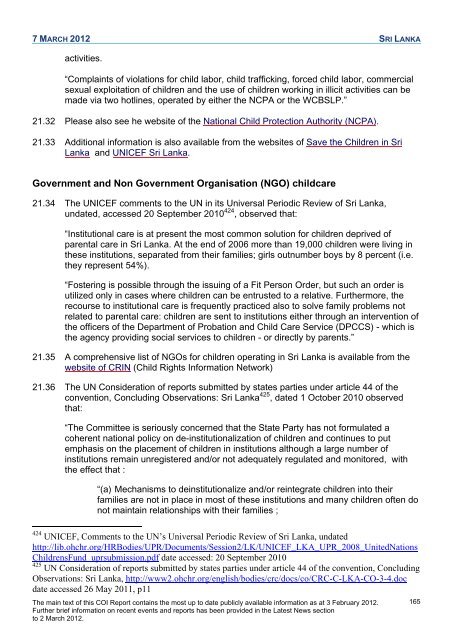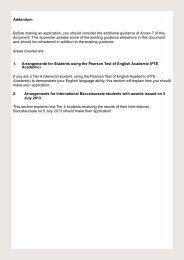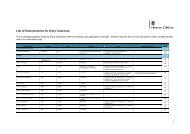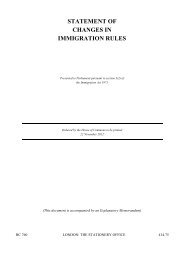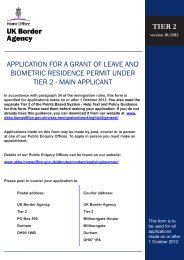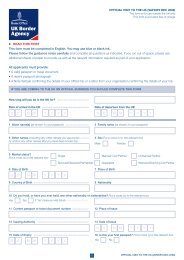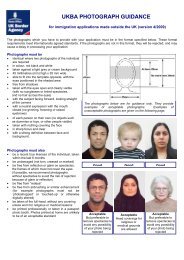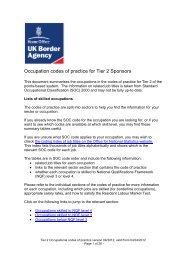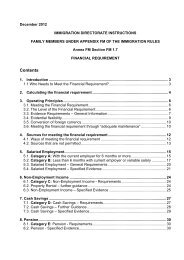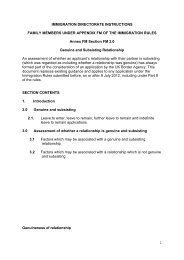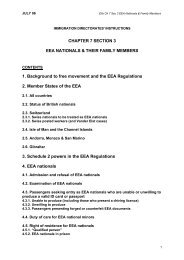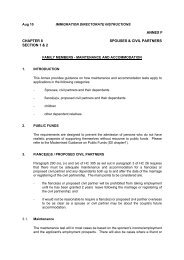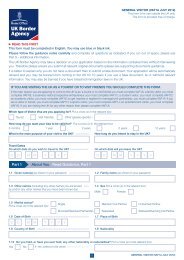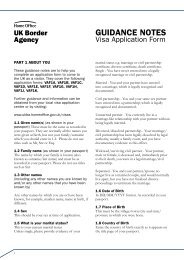COI Report March 2012 - UK Border Agency - Home Office
COI Report March 2012 - UK Border Agency - Home Office
COI Report March 2012 - UK Border Agency - Home Office
You also want an ePaper? Increase the reach of your titles
YUMPU automatically turns print PDFs into web optimized ePapers that Google loves.
7 MARCH <strong>2012</strong> SRI LANKA<br />
activities.<br />
―Complaints of violations for child labor, child trafficking, forced child labor, commercial<br />
sexual exploitation of children and the use of children working in illicit activities can be<br />
made via two hotlines, operated by either the NCPA or the WCBSLP.‖<br />
21.32 Please also see he website of the National Child Protection Authority (NCPA).<br />
21.33 Additional information is also available from the websites of Save the Children in Sri<br />
Lanka and UNICEF Sri Lanka.<br />
Government and Non Government Organisation (NGO) childcare<br />
21.34 The UNICEF comments to the UN in its Universal Periodic Review of Sri Lanka,<br />
undated, accessed 20 September 2010 424 , observed that:<br />
―Institutional care is at present the most common solution for children deprived of<br />
parental care in Sri Lanka. At the end of 2006 more than 19,000 children were living in<br />
these institutions, separated from their families; girls outnumber boys by 8 percent (i.e.<br />
they represent 54%).<br />
―Fostering is possible through the issuing of a Fit Person Order, but such an order is<br />
utilized only in cases where children can be entrusted to a relative. Furthermore, the<br />
recourse to institutional care is frequently practiced also to solve family problems not<br />
related to parental care: children are sent to institutions either through an intervention of<br />
the officers of the Department of Probation and Child Care Service (DPCCS) - which is<br />
the agency providing social services to children - or directly by parents.‖<br />
21.35 A comprehensive list of NGOs for children operating in Sri Lanka is available from the<br />
website of CRIN (Child Rights Information Network)<br />
21.36 The UN Consideration of reports submitted by states parties under article 44 of the<br />
convention, Concluding Observations: Sri Lanka 425 , dated 1 October 2010 observed<br />
that:<br />
―The Committee is seriously concerned that the State Party has not formulated a<br />
coherent national policy on de-institutionalization of children and continues to put<br />
emphasis on the placement of children in institutions although a large number of<br />
institutions remain unregistered and/or not adequately regulated and monitored, with<br />
the effect that :<br />
―(a) Mechanisms to deinstitutionalize and/or reintegrate children into their<br />
families are not in place in most of these institutions and many children often do<br />
not maintain relationships with their families ;<br />
424 UNICEF, Comments to the UN’s Universal Periodic Review of Sri Lanka, undated<br />
http://lib.ohchr.org/HRBodies/UPR/Documents/Session2/LK/UNICEF_LKA_UPR_2008_UnitedNations<br />
ChildrensFund_uprsubmission.pdf date accessed: 20 September 2010<br />
425 UN Consideration of reports submitted by states parties under article 44 of the convention, Concluding<br />
Observations: Sri Lanka, http://www2.ohchr.org/english/bodies/crc/docs/co/CRC-C-LKA-CO-3-4.doc<br />
date accessed 26 May 2011, p11<br />
The main text of this <strong>COI</strong> <strong>Report</strong> contains the most up to date publicly available information as at 3 February <strong>2012</strong>.<br />
Further brief information on recent events and reports has been provided in the Latest News section<br />
to 2 <strong>March</strong> <strong>2012</strong>.<br />
165


